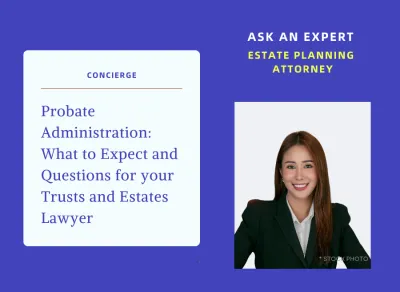Probate Administration - What to Expect and Questions for your Trusts and Estates Lawyer
Actions
I am a Verified Estate Planning Attorney in California. I am currently active in private practice in California. Concierge has verified my credentials, licensure, and active law practice.
I am available to educate and explain about probate administration. Depending on your questions, I can explain what you can expect, what the process is, what we look for, what patients are concerned with, what next steps may be, second opinions, more explanations for conditions, who the best centers are, what the current and new research is, and other context that may be specific to your facts.
About Probate Administration and Estate Planning
Probate administration is a legal process through which a deceased person's estate is settled and assets are distributed under court supervision. When an individual passes away, their assets, debts, and property may be subject to probate, depending on various factors such as the type of assets owned, estate planning strategies implemented, and state-specific probate laws. Here's an overview of probate administration and some common questions associated with the process:
Initiating Probate: Petition: The probate process typically begins with a petition filed in the appropriate state court, often by the named executor or a potential heir if no will exists; Appointment of Executor/Administrator: The court appoints an executor (if named in the will) or an administrator (if no will exists) to oversee the probate process, manage the estate's assets, pay debts and taxes, and distribute remaining assets to beneficiaries.
Inventory and Appraisal: Asset Valuation: The executor or administrator identifies, inventories, and appraises the deceased person's assets, including real estate, personal property, financial accounts, investments, and other valuables; Debt Settlement: Debts, liabilities, and claims against the estate, such as outstanding bills, taxes, mortgages, and creditor claims, are addressed and paid using estate assets.
Distribution of Assets: Beneficiary Designations: Assets subject to probate are distributed according to the deceased person's will or state intestacy laws if no will exists; Final Accounting: The executor or administrator prepares a final accounting of the estate's transactions, including income, expenses, distributions, and settlements, for court approval before concluding the probate process.
Disclosure: The image used here is for illustrative purposes only and may not directly represent the individual(s) or subject matter discussed. It is a stock photo intended to enhance the article's visual appeal and convey thematic relevance.
You may also like the following concierge gigs






















